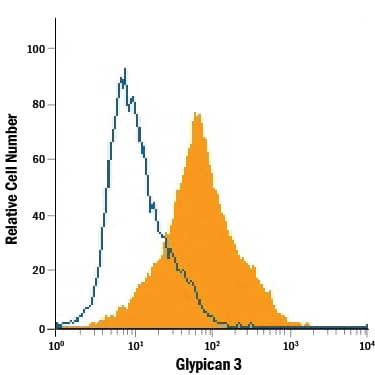Human Glypican 3 Alexa Fluor® 488-conjugated Antibody
R&D Systems, part of Bio-Techne | Catalog # FAB2119G


Key Product Details
Species Reactivity
Applications
Label
Antibody Source
Product Specifications
Immunogen
Gln25-Val558
Accession # P51654.1
Specificity
Clonality
Host
Isotype
Scientific Data Images for Human Glypican 3 Alexa Fluor® 488-conjugated Antibody
Detection of Glypican 3 in HepG2 Human Cell Line by Flow Cytometry.
HepG2 human hepatocellular carcinoma cell line was stained with Mouse Anti-Human Glypican 3 Alexa Fluor® 488-conjugated Monoclonal Antibody (Catalog # FAB2119G, filled histogram) or isotype control antibody (Catalog # IC003G, open histogram). View our protocol for Staining Membrane-associated Proteins.Applications for Human Glypican 3 Alexa Fluor® 488-conjugated Antibody
Flow Cytometry
Sample: HepG2 human hepatocellular carcinoma cell line
Reviewed Applications
Read 1 review rated 4 using FAB2119G in the following applications:
Formulation, Preparation, and Storage
Purification
Formulation
Shipping
Stability & Storage
- 12 months from date of receipt, 2 to 8 °C as supplied.
Background: Glypican 3
Glypicans (GPC) are a family of heparan sulfate proteoglycans that are attached to the cell surface by a glycosylphosphatidylinositol (GPI) anchor. Six members of this family have been identified in mammals (GPC1-GPC6). All glypican core proteins contain an N-terminal signal peptide, a large globular cysteine-rich domain (CRD) with 14 invariant cysteine residues, a stalk-like region containing the heparan sulfate attachment sites, and a C-terminal GPI attachment site. While glypican proteins do not share strong amino acid sequence identity (they range from 17-63%), the conserved cysteine residues in their CRDs suggests similarity in their three‑dimensional structure (1, 2).
Mutations in GPC3 cause a rare disorder in humans, Simpson-Golabi-Behmel Syndrome, which is characterized by pre and postnatal overgrowth of multiple tissues and organs and an increased risk for developing embryonic tumors (3). These features are also present in the mouse knock-out of GPC3 indicating that GPC3 regulates cell survival and inhibits cell proliferation during development (4). Glypican 3 has been implicated in regulating many different signaling pathways including: IGF, FGF, BMP, and Wnt. An endoproteolytic processing of GPC3 by proprotein convertases is required for the modulation of Wnt signaling (5). Direct interaction with FGF-basic has been observed and is mediated by the heparan sulfate chains (6).
References
- Filmus, J. and S.B. Selleck (2001) J. Clinical Invest. 108:497.
- De Cat, B and G. David (2001) Seminars in Cell & Dev. Biol. 12:117.
- Pilia, G. et al. (1996) Nat. Genet. 12: 241.
- Cano-Gauci, D.F. et al. (1999) J. Cell Biol. 146: 255.
- De Cat, B. et al. (2003) J. Cell Biol. 163:625.
- Song, H.H. et al. (1997) J. Biol. Chem. 272:7574.
Alternate Names
Gene Symbol
UniProt
Additional Glypican 3 Products
Product Specific Notices for Human Glypican 3 Alexa Fluor® 488-conjugated Antibody
This product is provided under an agreement between Life Technologies Corporation and R&D Systems, Inc, and the manufacture, use, sale or import of this product is subject to one or more US patents and corresponding non-US equivalents, owned by Life Technologies Corporation and its affiliates. The purchase of this product conveys to the buyer the non-transferable right to use the purchased amount of the product and components of the product only in research conducted by the buyer (whether the buyer is an academic or for-profit entity). The sale of this product is expressly conditioned on the buyer not using the product or its components (1) in manufacturing; (2) to provide a service, information, or data to an unaffiliated third party for payment; (3) for therapeutic, diagnostic or prophylactic purposes; (4) to resell, sell, or otherwise transfer this product or its components to any third party, or for any other commercial purpose. Life Technologies Corporation will not assert a claim against the buyer of the infringement of the above patents based on the manufacture, use or sale of a commercial product developed in research by the buyer in which this product or its components was employed, provided that neither this product nor any of its components was used in the manufacture of such product. For information on purchasing a license to this product for purposes other than research, contact Life Technologies Corporation, Cell Analysis Business Unit, Business Development, 29851 Willow Creek Road, Eugene, OR 97402, Tel: (541) 465-8300. Fax: (541) 335-0354.
For research use only